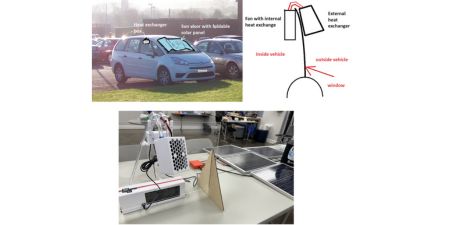
In this webinar, a student project is presented in which undergraduate Mechatronics students conducted a scientific research to solve a common everyday problem, and designed and built a system for that purpose. The goal of the project is to seek to solve the issue of the heat in parked vehicles in the summer through the use of a solar-powered cooling system.
During the hot summer months, the temperature inside a vehicle that is parked under the sun can reach 170 degrees F. The National Safety Council reports that on average 38 heat stroke deaths result every year in parked vehicles.
Recent advances in solar panels allowed them to have a high degree of mechanical flexibility without significant reduction in efficiency. The cooling system utilizes solar power generated from foldable or modular solar panels mounted on windscreen sun visors to cool down the passenger cabin of vehicles while the engine is not running. The cooling system works on a reverse heat pump, which means heat is being pumped out of the passenger cabin.
Results show that when a foldable or modular 100 Watt solar panel is used as a windshield shade to power the system. The cooling system effectiveness can be about 1.6% of a vehicle’s air conditioner that runs at full strength, or about 6.2% of spot cooling running at thermal comfort level for one occupant.
Therefore, although the system is not designed to support life and cannot support life in a vehicle under the sun, it however can increase chances of survival, and may provide sufficient transient thermal comfort when blown air is in direct contact with the occupant.
The educational impact from the project is significant in that students researched the best method to solve an everyday problem, and used the most recent technological advances in the field of solar power, and built a mechatronic system for that purpose.
This webinar is part of our Innovation series and runs approximately 30 minutes.
Presenter: Dr. Khalid Tantawi is an Assistant Professor of Mechatronics Engineering Technology at the University of Tennessee at Chattanooga.
Sign up for the CREATE Newsletter and stay updated on the latest information in Renewable Energy Education.
Copyright @ 2025 CREATE National Energy Center
This material is based upon work supported by the National Science Foundation under Grant #2201631. Any opinions, findings, and conclusions or recommendations expressed in this material are those of the author(s) and do not necessarily reflect the views of the National ScienceFoundation.